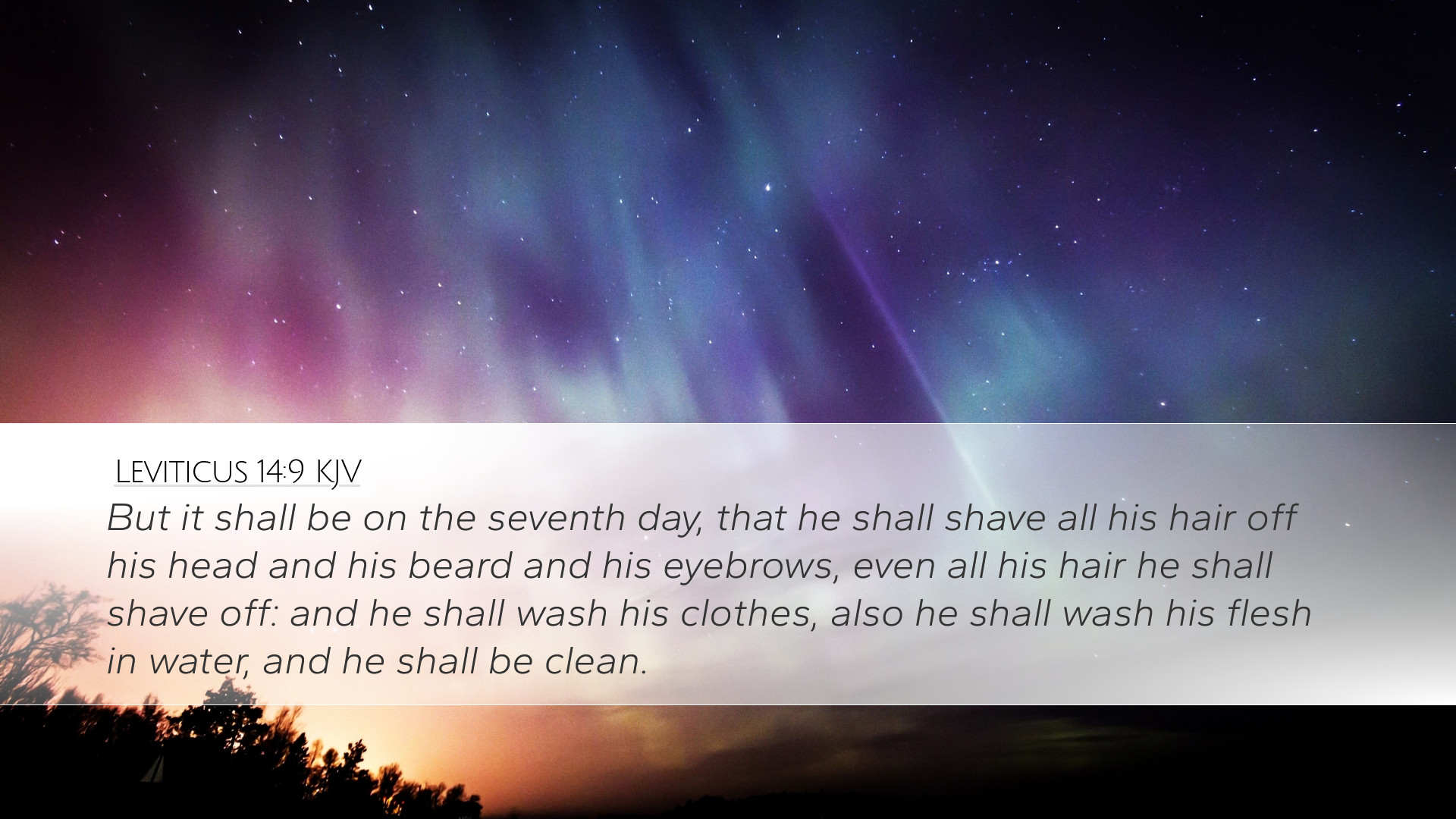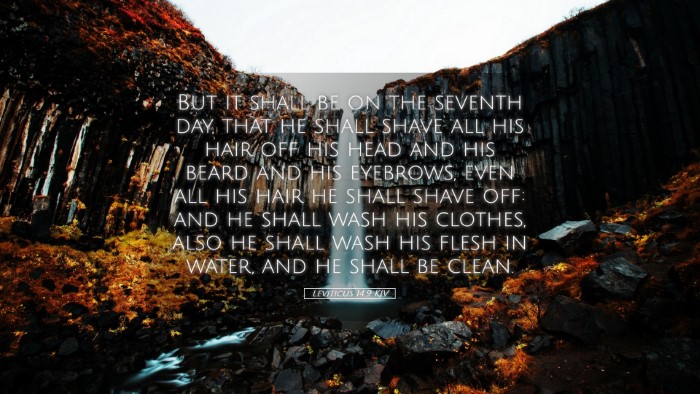Commentary on Leviticus 14:9
Leviticus 14:9 states: "And on the seventh day he shall shave all his hair off his head and his beard and his eyebrows, all his hair he shall shave off; and he shall wash his clothes and bathe his body in water, and he shall be clean. And after that he may come into the camp, but live outside his tent seven days." This verse is integral to the purification rites prescribed for those who have recovered from leprosy or other skin diseases, emphasizing the importance of ritual cleanliness and social re-integration.
Context and Significance
The context of Leviticus 14 is focused on the procedures for the ceremonial cleansing of those afflicted with leprosy. This affliction held both physical and social implications, as lepers were often ostracized from the community. The regulations outlined in this chapter underscore God’s concern for both the physical health and spiritual purity of His people.
- Ritual Purity: The act of shaving all hair is a profound symbol of complete purification, signaling the end of the diseased state and the beginning of restoration.
- Symbol of Renewal: The shaving and washing reinforce the transformative nature of God's cleansing power. It serves as a metaphor for spiritual rebirth.
- Community Restoration: The requirement to live outside one's tent for an additional seven days illustrates the delicate balance between personal health and societal purity, emphasizing the community's role in the individual’s reintegration.
Commentary Insights
Matthew Henry's Commentary
Matthew Henry highlights the necessity of thorough purification rituals. He explains that shaving the head, beard, and eyebrows signifies a complete renewal and that the act of bathing in water represents both physical and spiritual cleansing. He notes that the repeated emphasis on washing and cleansing in the Levitical laws aligns with the broader theme of holiness that permeates the book of Leviticus.
Albert Barnes' Notes
Albert Barnes elaborates on the importance of these purification rites, suggesting that they act as a prelude to re-entering communal life. He interprets the stipulation to live outside one's tent as a necessary precaution, indicating a period of observation to ensure that the individual is genuinely free from contamination. This observation period reflects God's instructions for care and diligence in maintaining communal purity.
Adam Clarke's Commentary
Adam Clarke emphasizes the significance of the number seven in this passage, identifying it as a symbol of completion and divine perfection. He argues that the seventh day represents a divinely ordained time for reflection and readiness before reintegration into the community. Clarke notes the profound spiritual implications of these actions, as each step in the purification process fosters a deeper understanding of God's grace and mercy.
Theological Implications
This verse serves as an important reminder of the balance between individual holiness and community responsibility. The thoroughness of the purification process signifies not only the individual's return to health but also the necessity for the community to ensure that such a transition occurs safely and respectfully.
- Holiness: The verse reaffirms the scriptural principle that God calls His people to holiness, which demands purification from disease, sin, and anything that compromises their relationship with Him.
- Community Dynamics: It reflects the dynamics of community and the rituals that bind individuals to their faith and people, highlighting the relational aspect of faith that transcends individual experience.
- Symbol of Christ: The processes outlined in Leviticus 14 can symbolically point to the work of Christ as the ultimate cleanser and healer, who restores individuals into fellowship with God and community.
Practical Application for Pastors and Theologians
For pastors and theologians, Leviticus 14:9 provides fertile ground for discussions surrounding spiritual renewal, healing, and the importance of community within the church.
- Healing Ministries: The call to physical and spiritual healing is paramount, encouraging pastors to pursue comprehensive healing ministries.
- Community Engagement: Encourage congregations to embrace those who have experienced struggles with sin or illness, providing a pathway toward reintegration and acceptance.
- Preaching on Holiness: This verse can serve as a basis for sermons on holiness, emphasizing that spiritual cleanliness is essential for a vibrant relationship with God.
Conclusion
Leviticus 14:9 is rich with meaning, providing insights that call for deep reflection on the themes of purification, community, and holiness. By integrating the perspectives of Matthew Henry, Albert Barnes, and Adam Clarke, we gain a fuller understanding of God's intention for His people—both then and now.


